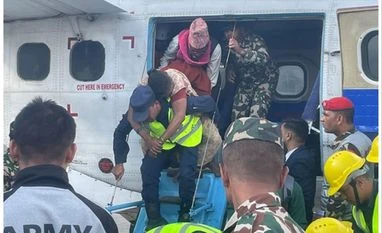At least 157 people were killed and over 160 others injured when a powerful 6.4 magnitude earthquake, the worst since 2015, struck Nepal and destroyed hundreds of houses in the Himalayan nation's remote mountainous region, officials said on Saturday.
According to the National Earthquake Monitoring and Research Centre, the earthquake with an epicentre in Jajarkot district, about 500km west of Kathmandu, was recorded at 11:47 pm on Friday.
Friday's earthquake is the most devastating one in Nepal since the 2015 earthquake that killed around 9,000 people and injured more than 22,000 others.
The impact of the quake was felt in Kathmandu and surrounding districts, and even in New Delhi in neighbouring India.
The Nepal Army has mobilised its personnel to carry out rescue work in the quake-hit areas, according to Nepal Army spokesperson Krishna Prasad Bhandari.
Rescue workers on Saturday dug through the rubble of collapsed houses to find survivors.
More From This Section
The Jajarkot and Rukum districts of western Nepal were worst hit by the quake.
As many as 157 people were killed so far in the quake, Home Ministry officials said. While 105 people were killed in Jajarkot, 52 died in Rukum West, they said, adding that 166 people were injured in Jajarkot, Rukum West, Dailekh and Jumla districts.
Deputy Mayor Sarita Singh of Nalgadh Municipality in Jajarkot was among those killed in the quake, officials said.
The death toll is expected to rise, they said.
The Nepal government has announced Rs 50 million each for Jajarkot and Rukum districts as immediate relief.
Additionally, the Home Ministry decided to allocate Rs 5.5 million to the disaster relief funds of both the Jajarkot and Rukum West districts, aiming to support the rescue and relief operations for the affected individuals.
India has also offered to extend all possible assistance to Nepal.
In a post on X, Prime Minister Narendra Modi said he is deeply saddened by the loss of lives and damage due to the earthquake in Nepal. India stands in solidarity with the people of Nepal and is ready to extend all possible assistance, he said.
The US embassy in Kathmandu said the United States stands ready to assist Nepal as it "recovers from this terrible earthquake".
China has also offered to provide emergency materials worth NPR 100 million to the affected districts of Jajarkot and Rukum, officials said.
Around 159 aftershocks have been recorded following last night's earthquake, the National Earthquake Monitoring and Research Centre reported.
Many people spent the night in the open because of fear of further quakes and damage to their houses. People were seen digging through the rubble to rescue trapped people from the remains of collapsed buildings, according to posts on social media.
As the roads were blocked and bridges damaged, rescue and relief work at the quake-hit sites have been obstructed, according to officials.
The Ministry of Home Affairs has dispatched initial relief supplies via the Nepali Army's helicopters.
Prime Minister Pushpakamal Dahal 'Prachanda' on Saturday toured the quake-hit region with a medical team Saturday morning.
During the visit, he gathered information about the extent of the damage and inspected the affected areas. Later, he returned to Surkhet from Jajarkot, along with seven injured people and their family members.
Prime Minister Pushpa Kamal Dahal has expressed his deep sorrow over the loss of lives and property in the earthquake on Friday night and has mobilised all the three security bodies for the immediate rescue and relief, reads a post from the prime minister's office on X.
Injured people are undergoing treatment at the Surkhet District Hospital, officials said. Prime Minister Prachanda has instructed security agencies to immediately carry out rescue and relief work.
President Ramchandra Paudel has expressed sadness over the loss of human lives and property in the earthquake.
According to the Office of the President, he has appealed to the government and all concerned to ensure effective rescue and relief work in the quake-affected areas.
Minister for Health and Population, Mohan Bahadur Basnet, has said the government will provide free treatment to those injured in the earthquake.
Earthquakes are common in Nepal which is situated on the ridge where the Tibetan and Indian tectonic plates meet and advance two meters closer to one another every century which results in pressure which is released in the form of earthquakes.
On October 16, Nepal's Sudurpaschim province was hit by a 4.8-magnitude earthquake.
On October 22, a 6.1 magnitude earthquake hit Kathmandu, the capital city of Nepal.
A 3-magnitude quake hit Nepal's capital city Kathmandu on October 3.
A collision between Indian and Tibetan plates has been going on underground for a long time which has accumulated tremendous energy, according to Bharat Koirala, senior seismologist at the National Earthquake Monitoring and Research Centre, Nepal.
Mainly, western Nepal is under the threat of bigger earthquakes, he pointed out.
The 2015 quake destroyed or damaged more than 800,000 houses mainly in the western and central districts, according to the International Federation of Red Cross and Red Crescent Societies (IFRC).
Government buildings, some stretches of roads and Kathmandu Valley's famous historical monuments - Unesco world heritage sites - were destroyed or damaged with many villages north of Kathmandu flattened.
)